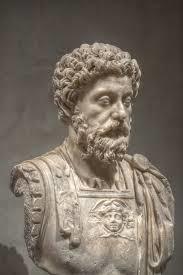
MARCUS AURELIUS ANTONINUS AUGUSTUS is a Roman emperor and a Stoic philosopher. He studies Greek and Latin under tutors such as Hērōidēs ho Attikos (Herodes Atticus) and Marcus Cornelius Fronto (Fronto).
He is campaigning between 170 and 180, when he writes (in Greek) what we now know as the Meditations. It is a collection of thoughts that he intends as a reference for his own guidance and self-improvement. We have no indications about the original title of this compilation of notes, if any. Meditations – as well as other titles, like To Himself – are all names adopted later. These profound and inspiring memos are representative of Stoic philosophy and spirituality. Meditations is also a literary testimony of a government in the name of service and duty.
First references to these notations are from Arethas (Arethas of Caesarea) in the 10th century and from the Byzantine Suda. The opera goes in print in 1558, in Zurich, from a manuscript which is lost afterwards. The oldest surviving complete manuscript copy is in the Vatican library and dates back to the 14th century.
Here is a passage in Meditations (2, 10) which says a lot about the Stoic standpoint of this emperor and philosopher. “Theophrastus says that sins committed out of desire are worse than sins committed out of anger. This is good philosophy. The angry man seems to turn his back on reason out of pain and inner convulsion. The man motivated by desire, who is under pleasure’s control, seems somehow more selfindulgent, less manly in his sins. Sins committed out of pleasure deserve a harsher rebuke than the ones committed out of pain. The angry man is more like a victim of wrongdoing, provoked by pain to anger. The other man rushes into wrongdoing on his own, moved to action by desire“.
Although they are Marcus’s own thoughts, the meditations are not original. They are basically the moral tenets of Stoicism. For instance, Marcus owes many of his ideas to Epiktetos. The cosmos is a whole and its ruler is a supreme reason. The human soul belongs to that divine intelligence. Thus the soul stands, before being corrupted, pure and undefiled amid madness and vanity. Nonetheless some of Marcus’s ideas diverge from Stoic philosophy and are closer to Platonism that was itself then turning into Neoplatonism. But the emperor does not deviate so far as to accept the comfort of any kind of survival after death.